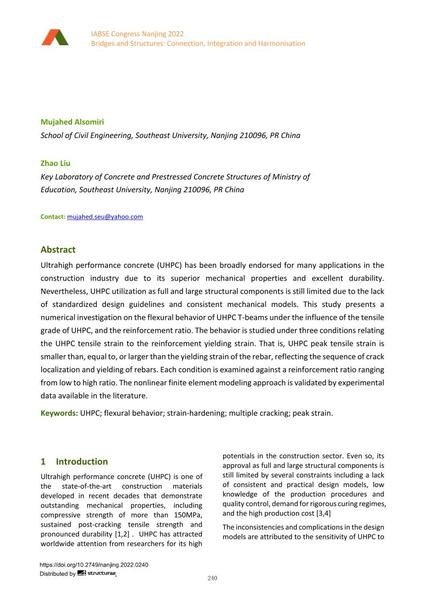Investigation on the Flexural Behavior of Reinforced UHPC T-Beams with Different Tensile Strain-Hardening Properties of Base Materials

|
|
|||||||||||
Bibliografische Angaben
| Autor(en): |
Mujahed Alsomiri
(School of Civil Engineering, Southeast University, Nanjing 210096, PR China)
Zhao Liu (Key Laboratory of Concrete and Prestressed Concrete Structures of Ministry of Education, Southeast University, Nanjing 210096, PR China) |
||||
|---|---|---|---|---|---|
| Medium: | Tagungsbeitrag | ||||
| Sprache(n): | Englisch | ||||
| Tagung: | IABSE Congress: Bridges and Structures: Connection, Integration and Harmonisation, Nanjing, People's Republic of China, 21-23 September 2022 | ||||
| Veröffentlicht in: | IABSE Congress Nanjing 2022 | ||||
|
|||||
| Seite(n): | 240-248 | ||||
| Anzahl der Seiten (im PDF): | 9 | ||||
| DOI: | 10.2749/nanjing.2022.0240 | ||||
| Abstrakt: |
Ultrahigh performance concrete (UHPC) has been broadly endorsed for many applications in the construction industry due to its superior mechanical properties and excellent durability. Nevertheless, UHPC utilization as full and large structural components is still limited due to the lack of standardized design guidelines and consistent mechanical models. This study presents a numerical investigation on the flexural behavior of UHPC T-beams under the influence of the tensile grade of UHPC, and the reinforcement ratio. The behavior is studied under three conditions relating the UHPC tensile strain to the reinforcement yielding strain. That is, UHPC peak tensile strain is smaller than, equal to, or larger than the yielding strain of the rebar, reflecting the sequence of crack localization and yielding of rebars. Each condition is examined against a reinforcement ratio ranging from low to high ratio. The nonlinear finite element modeling approach is validated by experimental data available in the literature. |
||||
| Stichwörter: |
UHPC
|
||||
| Copyright: | © 2022 International Association for Bridge and Structural Engineering (IABSE) | ||||
| Lizenz: | Die Urheberrechte (Copyright) für dieses Werk sind rechtlich geschützt. Es darf nicht ohne die Zustimmung des Autors/der Autorin oder Rechteinhabers/-in weiter benutzt werden. |
||||
